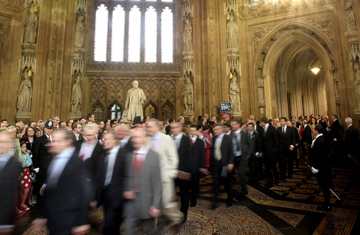
MPs walk through the central lobby from the House of Commons to the House of Lords during the state opening of the Houses of Parliament in London on May 25, 2010
In the two weeks since British voters forced the formation of a coalition government, duly elected Members of Parliament have been descending on London from across the country. By the time the Queen opened the first session of the new government on Tuesday, May 25, all of them had taken their seats in England's ancient lower house — but at the moment, they'd settle for their own desks.
After an election in the U.K., there's no transition process, no gentle easing-in as policies and staff change: the Cabinet is formed in a day or two; then the House of Commons reactivates, heaving itself into motion like the archetypally nimble fat man. Many phone lines are still not set up, and MPs are currently hot-desking, awaiting offices whose assignment can take four to six weeks. This barely ordered chaos is to be expected, but entering into it is a Parliament that's more unusual than most. Not only did the electorate opt for the U.K.'s first hung Parliament in 36 years on May 6, but it also chose a record number of new MPs — 232 out of 650 — many of whom, until now, had no experience in Westminster.
One new member is Priti Patel, MP for Witham, in the southeast of London, and the Conservative Party's first-ever female MP of Asian descent. Patel is about as close to an old hand as a new MP gets, having previously worked in Westminster with William Hague, then leader of the opposition and now Foreign Secretary. "It's fair to say that I've gone into politics with my eyes wide open," she tells TIME. And what she sees is a Parliament that's demographically more diverse than any that has come before, with more women (142) and more ethnic minorities (26) added to the ranks. "Parliament looks different, feels different and sounds different," Patel says.
Like Patel, many of those new to Parliament aren't all that new to politics. But there are some who have taken a less well-worn path to the Commons. Gordon Birtwistle, Liberal Democrat MP for Burnley, in the northwest of England, has the honor of being the oldest new Member of Parliament: at 66, he's more than 20 years older than Prime Minister David Cameron and 16 years older than the parliamentary average. A latecomer to the whole affair — "too late," he jokes — he says he's still having trouble believing he now has a seat in the House of Commons. "It were quite a shock," he says in a broad Lancashire accent, of his election to Parliament. But even after his having been involved in politics for the past 28 years, the experience of entering Westminster as an older newbie surrounded by "the fresh university students with degrees coming out of their ears" can be uncomfortable, Birtwistle admits — although he is quick to point out the benefits of the wisdom that comes with age.
Of course, age is relative in Westminster Palace, parts of which date to 1097. Under the best vaulted ceilings neo-Gothic architecture has to offer, the old is in constant friction with the new. MPs are provided with Dell laptops and BlackBerry Curves, but in the House of Commons cloakroom, they are also allocated their own coat hangers, each of which has a pink ribbon — for hanging up their swords. "I have to say," Birtwistle says, "I haven't seen any swords being hung."
With a full house of new MPs, plans to modernize the Commons saw authorities organizing something previously unheard of: inductions. In the first week of Parliament, new members were to be shown the ropes, with tours, talks, behavioral guidelines and directions to the toilets. But all this foresight was brushed aside by the election, which kept the country in limbo for five days as the Conservatives and the Liberal Democrats worked out a deal to form a coalition government. The new MPs took a tour but had little time for anything else. And in a place as large and complex as Westminster Palace, one tour is never quite enough. Says Birtwistle: "It's a very complex place. You can imagine all the nooks and crannies. But I'm finding my way around a bit now."
Ultimately, though, getting a tour of the House is perhaps the only introduction that's truly important. The symbolism of the Commons is not lost on the new MPs, standing as it does for an enduring tradition of government. But while Patel says, "You don't just come here and be starstruck — you've got a job to do," the new MPs betray a sense of wonder. "It's amazing," says Patel of the first sitting of Parliament on Tuesday. "I have friends, colleagues I've known over the years, actually sitting in pole position — in government." Birtwistle echoes the sentiment. "I feel pride," he says. "This is an amazing place. An absolutely amazing place."
On May 25, Parliament opened with the Queen's speech officially laying out the new coalition government's agenda. Already the new MPs have started making their maiden speeches, one by one grabbing their chance to stand out and make a first impression. Patel is planning to wait a while before making hers. "Nothing too early," she says. "There'll be 230 of them. That's a lot of maiden speeches, and I don't want to go totally unnoticed." According to some accounts, when Isaac Newton made his first speech as an MP in 1689, it was a request to close a window, as he could feel a draft. Perhaps one of the new MPs should ask about the desks.
